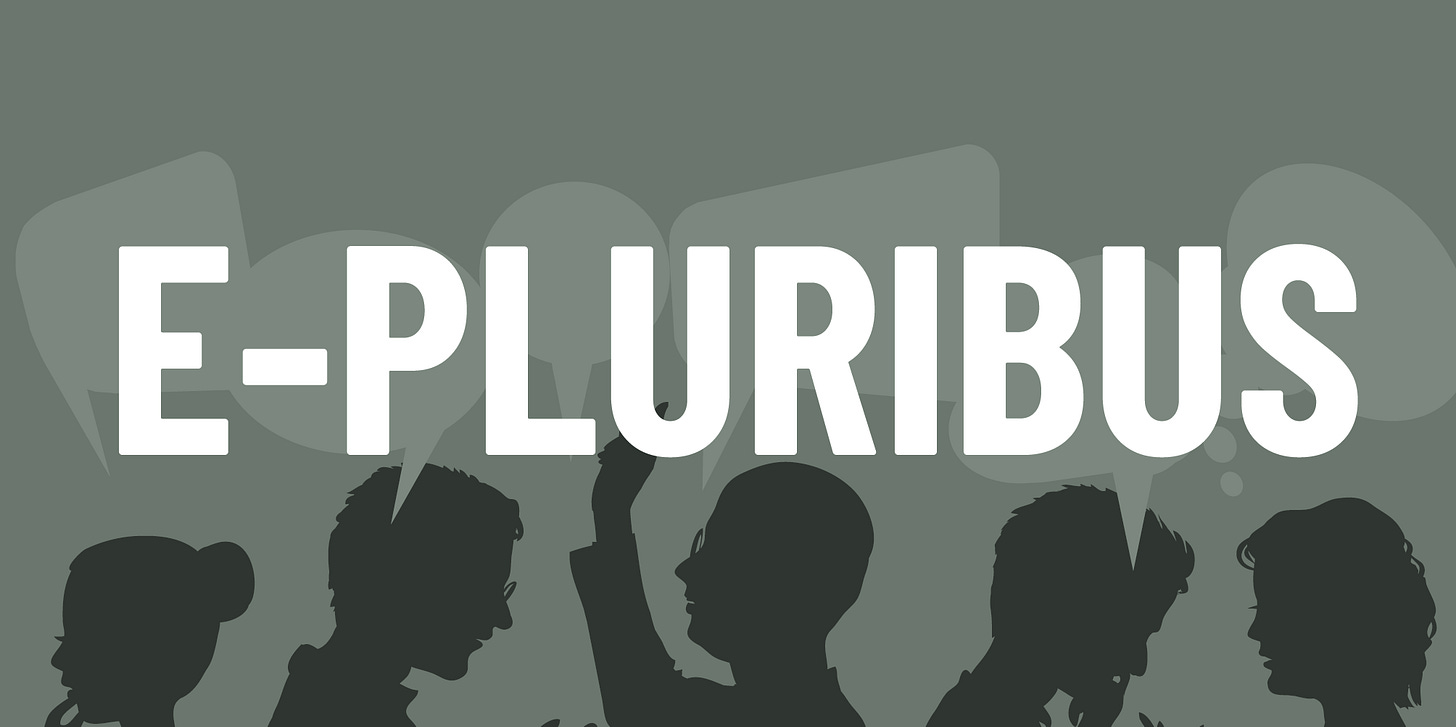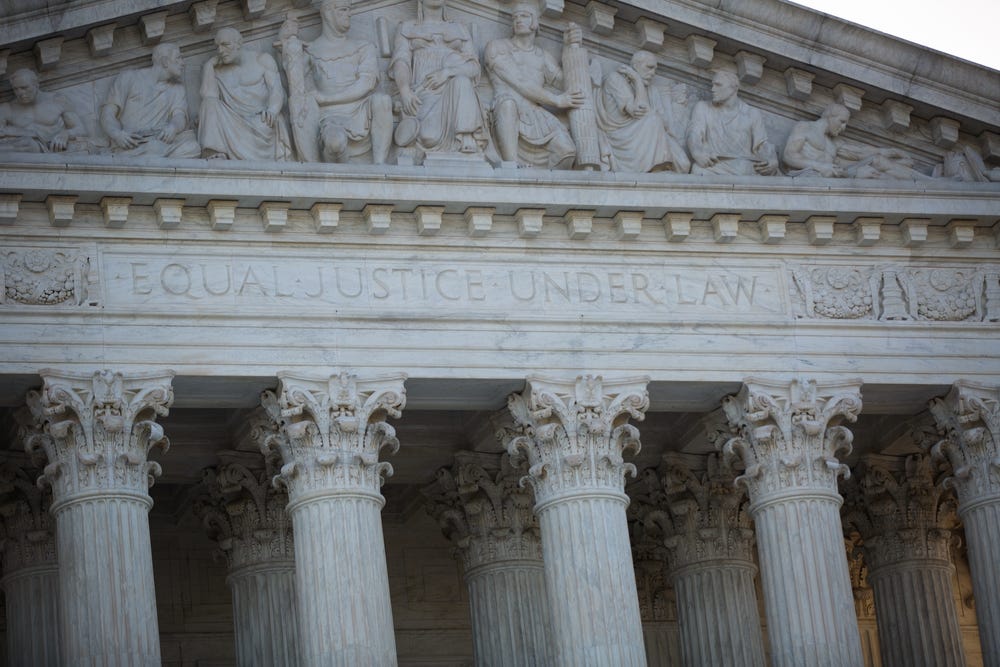E-Pluribus | September 3, 2021
Masking and civil rights, Australia and freedom, and a liberal Supreme Court justice and court packing.
A round up of the latest and best writing and musings on the rise of illiberalism in the public discourse:
Bob Driscoll: Are Mandatory Masks in Schools a Civil Right?
Few issues have stirred up as much rachor and debate during the pandemic as masks. This week, the Department of Education’s Office of Civil Rights (OCR) stepped into the fray, investigating whether bans on mask mandates violate the civil rights of students with disabilities. Bob Driscoll, a former deputy assistant attorney general for civil rights with the Department of Justice, argues at The Dispatch that this does an injustice to true civil rights and may amount to no more than posturing by a Biden administration seeking to look as zealous as possible in its COVID-19 response.
For many people, the term “civil rights” is inextricably linked to the movements to achieve racial equality. But that is just one of the bundle of “civil rights” that the law protects. There are also laws to protect individuals with disabilities from discrimination in accessibility, employment, and education, among other spheres. Although most Americans think of the Americans with Disabilities Act (ADA), passed in the early 1990s, as the primary law protecting the disabled from discrimination, Section 504 of the Rehabilitation Act of 1973 had already prohibited recipients of federal funds from denying individuals with disabilities an equal opportunity to participate in programs that are funded to any degree with federal money. And so it is Section 504 of the Rehabilitation Act, along with Title II of the ADA (which extended Section 504’s protections to all activities of state and local governments, whether federally funded or not) that are invoked by OCR [Department of Education’s Office of Civil Rights] as the source of its authority to investigate state-level prohibitions on local school board mask mandates.
[…]
The second problem with the OCR approach is more fundamental: It uses federal civil rights law to override a state educational decision using what is essentially a “disparate impact” basis. This technique could convert virtually any state or local decision into a federal one. Of course, when dealing with intentional discrimination, the anti-democratic nature of civil rights laws are the point: It doesn’t matter whether a local school board wants black students to attend a public school or not, they have a right to. Similarly, a school cannot deny a reasonable modification of an existing rule or policy to disabled students whether or not that idea is popular.
But once the federal government begins to broaden its focus to neutral laws that might have a “disparate impact” on a protected class, there is virtually no limit to possibilities of federal second-guessing. The other side of the masking issue is a great example—mandatory masks, just like bans on mandatory masks, might benefit some students and burden others, but that is exactly the balancing that states and localities must do. Were the Trump administration still in office, a state mask requirement in Virginia or Massachusetts could just as easily be subject to a Trump OCR “investigation” premised on the allegation that jurisdictions with low transmission of COVID and thus at low risk were prevented from adopting no mask rules that would maximize the ability of autistic children or lip readers to attend schools on an integrated basis. In my view, this hypothetical Trump OCR investigation, like the current Biden OCR investigation, would not be well-founded because it would use disability law as the pretext to force change in a local political decision the federal government doesn’t agree with.
Read the whole thing here.
Conor Friedersdorf: Australia Traded Away Too Much Liberty
Australia has long maintained the aura of a country of independent, free-spirited renegades, but Conor Friedersdorf contents that the draconian measures put in place down under threaten that reputation, not to mention its status as a functioning liberal democracy. Some of the steps taken are downright Orwellian and, though put in place with apparent good intention nonetheless, represent a sea change in what citizens of a free society may be willing to subject themselves to for an increased sense of security.
Before 2020, the idea of Australia all but forbidding its citizens from leaving the country, a restriction associated with Communist regimes, was unthinkable. Today, it is a widely accepted policy. “Australia’s borders are currently closed and international travel from Australia remains strictly controlled to help prevent the spread of COVID-19,” a government website declares. “International travel from Australia is only available if you are exempt or you have been granted an individual exemption.” The rule is enforced despite assurances on another government website, dedicated to setting forth Australia’s human-rights-treaty obligations, that the freedom to leave a country “cannot be made dependent on establishing a purpose or reason for leaving.”
The nation’s high court struck down a challenge to the country’s COVID-19 restrictions. “It may be accepted that the travel restrictions are harsh. It may also be accepted that they intrude upon individual rights,” it ruled. “But Parliament was aware of that.” Until last month, Australians who are residents of foreign countries were exempt from the rule so they could return to their residence. But the government tightened the restrictions further, trapping many of them in the country too.
[…]
Australia is undoubtedly a democracy, with multiple political parties, regular elections, and the peaceful transfer of power. But if a country indefinitely forbids its own citizens from leaving its borders, strands tens of thousands of its citizens abroad, puts strict rules on intrastate travel, prohibits citizens from leaving home without an excuse from an official government list, mandates masks even when people are outdoors and socially distanced, deploys the military to enforce those rules, bans protest, and arrests and fines dissenters, is that country still a liberal democracy?
Read the whole thing.
Damon Root: Stephen Breyer Makes the Liberal Case Against Court Packing
The recent decision by the Supreme Court to allow a new Texas anti-abortion law to go into effect has renewed calls to expand the court by some Democrats, but Damon Root writes that the idea is met with opposition from a somewhat unexpected source: liberal Justice Stephen Breyer. In a new book, Breyer warns that playing can-you-top-this with the highest court in the land will not end well for anyone, undermining the legitimacy of the body with the final word on the supreme law of the land.
Such whatifs are the driving force behind Justice Stephen Breyer's timely and important new book, The Authority of the Court and the Peril of Politics (Harvard University Press). The 83-year-old Supreme Court justice is well aware that many modern liberals want President Joe Biden to pack the Court and create a new liberal supermajority. Breyer thinks those liberal court packers are being both dimwitted and shortsighted. "Think long and hard," Breyer warns them, "before embodying those changes in law."
Court packing is a naked power grab and an attack on the independence of the judiciary. It is a tit-for-tat race to the bottom. One party expands the size of the bench for nakedly partisan purposes, so the other party does the same (or worse) as soon as it gets the chance. Breyer understands this. He also understands something else: If the authority of the Supreme Court is trashed and squandered by court packing, then liberalism itself is going to suffer in the long run.
Let history be our guide. President Andrew Jackson flatly ignored the Supreme Court's 1832 decision in Worcester v. Georgia, which ruled in favor of Cherokee control over Cherokee territory. Jackson later sent federal troops to forcibly remove the Cherokee people via the infamous Trail of Tears. The rule of law suffers when the political branches ignore the judiciary's judgment.
Breyer worries that today's liberal court packers are going to severely undermine judicial authority and pave the way for the next Andrew Jackson. "Whether particular decisions are right or wrong," Breyer writes, "is not the issue here." The issue "is the general tendency of the public to respect and follow judicial decisions, a habit developed over the course of American history." One of the biggest risks of court packing is that it will reverse that general tendency.
Just imagine what American history would look like without basic political and public support for the Court's decisions, Breyer writes. What "would have happened to all those Americans who espoused unpopular political beliefs, to those who practiced or advocated minority religions, to those who argued for an end to segregation in the South? What would have happened to criminal defendants unable to afford a lawyer, to those whose houses government officials wished to search without probable cause?"
Read it all.
Around Twitter
Conor Friedersdorf posted some email responses to his recent Atlantic article (item #2 above). Here are a few; click through for the rest:


Elad Gil highlights one of the more disturbing passages from Friedersdorf’s piece:
Via Ryan T. Anderson, Amazon is reportedly implementing new pro-active removal policies on content violations:


And finally, via Wesley Yang, how the new vocabulary of the diversity and inclusion industry spreads:














